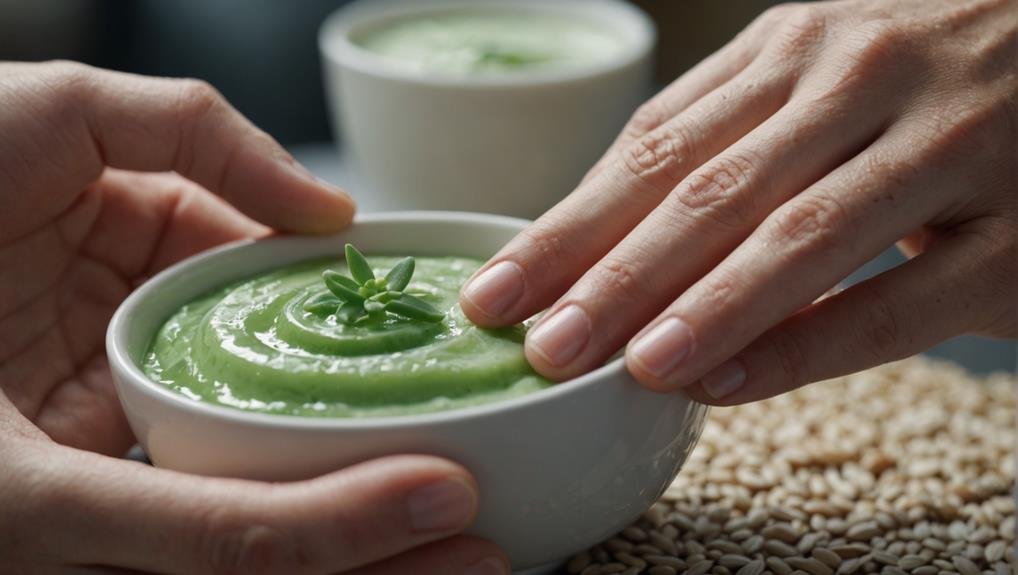"Cherishing Little Steps - A Haven for Baby and Family Journeys"
How to Treat Sensitive Skin Naturally#COMMA
If you've been struggling with sensitive skin, finding natural ways to care for it can make a significant difference. From soothing ingredients to gentle skincare practices, the path to healthier skin lies in embracing a more holistic approach. By exploring the benefits of natural remedies and DIY skincare solutions, you can effectively address sensitivity without resorting to harsh chemicals. So, if you're ready to nurture your skin in a gentle yet effective manner, let's uncover the secrets to treating sensitive skin naturally.
Key Takeaways
- Use gentle, natural ingredients to avoid irritants.
- Incorporate soothing face masks with calming ingredients.
- Opt for hypoallergenic products and fragrance-free options.
- Consult a dermatologist for personalized skincare advice.
Understanding Sensitive Skin

If you find that your skin easily reacts to various products or environmental factors, you may have sensitive skin. Sensitive skin is often characterized by a compromised skin barrier, which is the outermost layer of the skin that acts as a protective shield. This barrier can be weakened due to genetics, underlying skin conditions, or external factors such as harsh weather, pollution, or certain skincare products.
When the skin barrier is compromised, it becomes more susceptible to irritants and allergens, leading to redness, itching, and dryness. External factors like UV radiation, pollution, and extreme temperatures can further exacerbate these symptoms, making it crucial to identify and avoid triggers that can worsen sensitive skin.
Understanding the role of the skin barrier and how external factors can impact its function is essential in managing sensitive skin effectively.
Identifying Triggers
Identifying triggers that can aggravate sensitive skin is crucial in managing and minimizing skin reactions effectively. To help you pinpoint what might be causing your skin distress, consider the following:
- Skincare routine: Take note of the products you use on your skin daily. Harsh chemicals, fragrances, or certain ingredients may be triggering sensitivity reactions. Consider switching to gentle, fragrance-free products specifically formulated for sensitive skin.
- Allergen testing: Consider undergoing allergen testing to identify any specific allergens that could be exacerbating your skin sensitivity. Knowing your triggers can help you avoid them in the future.
- Environmental factors: Pay attention to how your skin reacts to different environmental conditions such as extreme temperatures, humidity levels, or pollution. Protect your skin by using appropriate skincare products and adjusting your routine accordingly.
Gentle Cleansing Techniques

Consider adopting gentle cleansing techniques to care for your sensitive skin effectively and minimize potential irritations. Oil cleansing is a method that involves using natural oils to cleanse the skin without stripping it of its natural oils. This technique can be beneficial for sensitive skin as it helps maintain the skin's moisture barrier and can be less irritating compared to traditional cleansers.
Another gentle cleansing option is using micellar water, a no-rinse cleanser that attracts dirt and impurities without harsh scrubbing. Micellar water is suitable for sensitive skin as it's gentle and doesn't contain harsh chemicals that can aggravate delicate skin. It provides a quick and effective cleanse without causing irritation, making it a great option for those with sensitive skin.
Moisturizing With Natural Ingredients
Using natural ingredients for moisturizing can be a gentle and effective way to nourish and hydrate sensitive skin without causing irritation. When it comes to caring for your sensitive skin, opting for herbal remedies and DIY lotions can provide the hydration your skin needs without harsh chemicals.
Incorporating essential oils into your skincare routine can also offer added benefits due to their natural properties. Natural serums are another excellent option for moisturizing, as they're often lightweight and easily absorbed, making them suitable for sensitive skin.
Soothing Face Masks

Explore the rejuvenating benefits of soothing face masks as a natural way to pamper and nourish your sensitive skin. Natural remedies and DIY solutions can provide your skin with the care it craves without harsh chemicals or irritants. For sensitive skin, it's crucial to choose ingredients that are gentle and calming.
Creating your own soothing face mask can be a fun and rewarding experience. Ingredients like oatmeal, aloe vera, honey, and yogurt are known for their soothing properties and can be easily combined to make a nourishing mask at home.
Oatmeal, for instance, helps to calm irritation and redness, while honey acts as a humectant, locking in moisture.
When applying a soothing face mask, remember to be gentle and avoid harsh rubbing. Allow the mask to sit for the recommended time before gently washing it off with lukewarm water.
Incorporating soothing face masks into your skincare routine can help keep your sensitive skin feeling refreshed and revitalized.
Calming Bath Additions
Enhance your bathing experience with calming additions that can help soothe and nourish your sensitive skin naturally.
When it comes to pampering your skin, consider incorporating the following calming bath additions:
- Aromatherapy blends: Infuse your bath with essential oils like lavender, chamomile, or rosemary to promote relaxation and reduce skin irritation. The soothing scents can also help calm your mind and alleviate stress, which is beneficial for sensitive skin.
- Relaxation techniques: Practice deep breathing or mindfulness exercises while soaking in the tub to further enhance the calming effects of your bath. Stress can exacerbate skin sensitivity, so taking time to relax can benefit both your skin and overall well-being.
- Herbal infusions: Adding herbs like calendula, oatmeal, or green tea to your bathwater can provide anti-inflammatory and antioxidant properties that are gentle on sensitive skin. These natural ingredients can help soothe irritation and nourish your skin without harsh chemicals.
Hydrating From Within

To maintain optimal skin hydration levels and support your skin's health, ensure you're drinking an adequate amount of water throughout the day. Hydrating from within is essential for keeping your skin supple and healthy.
In addition to water, incorporating dietary supplements like omega-3 fatty acids can help balance hydration levels in your skin, reducing dryness and sensitivity.
Herbal remedies can also play a significant role in promoting skin elasticity and hydration. For instance, incorporating herbs like aloe vera or calendula into your diet can help soothe sensitive skin and improve its ability to retain moisture. These natural remedies can work in conjunction with your skincare routine to provide a holistic approach to skin health.
Remember that hydrating from within is a long-term solution that can positively impact your skin's overall condition. By incorporating water, dietary supplements, and herbal remedies into your daily routine, you can help your skin maintain a healthy balance of hydration and promote elasticity naturally.
Sun Protection Tips
Maintaining optimal skin hydration levels is vital for skin health, and another crucial aspect of skincare is protecting your skin from the sun's harmful rays.
Sunscreen application is key to safeguarding your skin from UV damage. Here are some essential sun protection tips for sensitive skin:
- Choose a Broad-Spectrum Sunscreen: Opt for a sunscreen that offers broad-spectrum protection against both UVA and UVB rays.
- Apply Sunscreen Generously: Be sure to apply sunscreen generously to all exposed areas of your skin at least 15 minutes before heading outdoors.
- Reapply Every Two Hours: Remember to reapply sunscreen every two hours, especially if you're swimming or sweating.
Avoiding Common Irritants

Protecting sensitive skin involves being mindful of common irritants that can trigger reactions and compromise skin health. To safeguard your skin, opt for natural remedies and hypoallergenic products.
Natural remedies such as aloe vera, oatmeal, and chamomile can help soothe sensitive skin and reduce inflammation without harsh chemicals that may cause irritation. When selecting skincare products, look for labels that indicate they're hypoallergenic, meaning they're formulated to minimize the risk of allergic reactions.
Avoid products with fragrances, alcohol, parabens, and sulfates, as these can be harsh on sensitive skin. Opt for gentle, fragrance-free cleansers, moisturizers, and sunscreen to maintain skin health without causing irritation.
DIY Skincare Recipes
Consider incorporating homemade skincare recipes into your routine to cater to your sensitive skin's needs naturally. Using organic ingredients in your DIY skincare can help avoid common irritants found in commercial products. Homemade remedies can be gentle yet effective for sensitive skin, providing nourishment and soothing properties.
Here are some simple recipes you can try at home:
- Honey and Oatmeal Face Mask: Mix organic honey with ground oatmeal to create a calming mask that hydrates and reduces redness.
- Coconut Oil Body Scrub: Combine organic coconut oil with sugar to gently exfoliate and moisturize sensitive skin.
- Aloe Vera Gel Spot Treatment: Apply fresh aloe vera gel directly onto irritated areas for its anti-inflammatory and healing benefits.
Experiment with these homemade recipes to discover what works best for your sensitive skin, providing a natural and personalized skincare routine.
Consulting With a Dermatologist

Seeking guidance from a dermatologist is crucial for effectively managing and addressing your sensitive skin concerns. Dermatologists are specialized in diagnosing and treating various skin conditions, including sensitivity. They can provide tailored advice on skincare routines and recommend suitable products that won't irritate your skin further. Additionally, they can offer professional advice on natural remedies and medical guidance to alleviate your sensitive skin symptoms.
| Skin Care Routines | Professional Advice | Natural Remedies | Medical Guidance |
|---|---|---|---|
| Use gentle cleansers | Seek a patch test before trying new products | Aloe vera for soothing inflamed skin | Prescription creams for severe sensitivity |
| Moisturize regularly | Avoid harsh exfoliants | Chamomile for calming redness | Allergy testing for identifying triggers |
| Apply sunscreen daily | Opt for fragrance-free products | Oatmeal baths for itch relief | Laser therapy for persistent issues |
Lifestyle Changes for Skin Health
Making adjustments to your daily habits and routines can significantly impact the health and condition of your skin. Here are some lifestyle changes you can incorporate to promote skin health:
- Dietary Adjustments: Consuming a balanced diet rich in fruits, vegetables, and healthy fats can provide essential nutrients for skin health.
- Stress Management: Implementing stress-reducing activities such as meditation, yoga, or deep breathing exercises can help improve skin conditions affected by stress.
- Holistic Approaches: Exploring holistic practices like acupuncture, herbal remedies, or aromatherapy may complement traditional skincare routines and benefit sensitive skin.
Frequently Asked Questions
Can Essential Oils Help Soothe Sensitive Skin?
Essential oils can indeed help soothe sensitive skin. When used properly, these herbal remedies offer aromatherapy benefits that can calm and nourish your skin. Be mindful of dilution and patch testing to avoid irritation.
What Foods Should I Avoid for Sensitive Skin?
Are you wondering what foods to avoid for sensitive skin? Limiting dairy products, sugar, gluten, and caffeine can help reduce inflammation and potential triggers. Opt for a balanced diet rich in fruits, vegetables, and whole grains instead.
Is Natural Sunscreen Effective for Sensitive Skin?
Natural sunscreen can be effective for sensitive skin. Look for products with gentle ingredients like zinc oxide or titanium dioxide. Alternatively, consider homemade remedies like coconut oil or shea butter for natural sun protection without causing sensitivity.
Can Stress Worsen Sensitive Skin Conditions?
Stress can indeed worsen sensitive skin conditions. Proper stress management techniques, like meditation or exercise, can help. Ensure your skincare routine is gentle and soothing to minimize the impact of stress on your skin.
Are There Specific Fabrics That Are Gentle on Sensitive Skin?
For sensitive skin, consider hypoallergenic clothing like silk or cotton. Silk is luxurious and gentle, while cotton is breathable and affordable. Organic skincare offers benefits like natural ingredients but drawbacks such as shorter shelf life.
Conclusion
In conclusion, treating sensitive skin naturally is like walking on eggshells – delicate and cautious.
By embracing gentle skincare practices, using natural remedies, and making lifestyle adjustments, you can effectively manage sensitivity without harsh chemicals.
Remember, the key is to listen to your skin, identify triggers, and nourish it with soothing ingredients.
With patience and dedication, you can achieve a healthier, happier complexion free from irritation.

